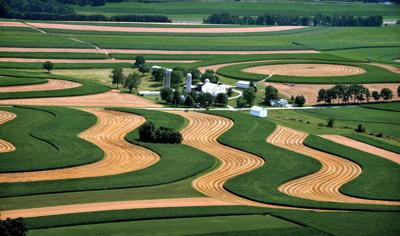A new $867 billion Farm Bill passed by Congress this week has plenty of programs that will affect Lancaster County’s farmers who produce milk, vegetables, fruit, organic products and, maybe soon, large-scale fields of hemp.
The bill was broadly lauded by farming, organic, environmental and wildlife groups — even the Independent Community Bankers of America.
The bill’s drafters, citing the Congressional Budget Office, said spending levels will not increase the federal deficit from projections already made.
But there was also some criticism. Conservative Republicans were disappointed over their failure to get welfare reform into the bill — especially more work requirements for some who receive food stamps.
Some in Congress decried an expansion of loopholes for farmers eligible to receive subsidies, including distant relatives of farm families who don’t even work on the farm and large industrial farm operations.
What’s in the bill
Funding for various financial safety nets for struggling farmers — including crop insurance and farm subsidies — are increasing amid low farm product prices and flagging trade opportunities because of a tariff war.
Farmers markets will get a boost in marketing funding, farmers who use environmentally sound winter cover crops will be rewarded financially and new money is allotted to train new farmers to take over from an aging generation.
Lancaster County farmers who are asked to step up on-the-farm conservation measures will get increased funding to help pay for the improvements.
A priority request by Pennsylvania members of Congress to get $75 million to combat the potentially devastating spotted lanternfly insect invader made the final cut.
“This bill provides much-needed relief for our hardworking farmers to help them get through tough times,” U.S. Rep. Lloyd Smucker said of the Farm Bill.
“A new law is especially important for dairy, a sector struggling with low prices and disrupted imports,” said the National Milk Producers Federation.
The great majority of funding for the Farm Bill goes not to agriculture but for underwriting the Supplemental Nutrition Assistance Program (or SNAP), formerly known as Food Stamps.
President Donald Trump is expected to sign the Farm Bill into law next week. The bill, which provides funding over a 10-year period, is $89 billion less than the last Farm Bill, adopted in 2014.
Here’s a look at some of the specific programs that may influence Lancaster County’s state-leading agriculture industry.
Farmer safety nets
Commodity payments to farmers when crop prices drop precipitously or farmers’ income dips will be increased by about $1 billion nationwide over 10 years.
For dairy farmers specifically, coverage will increase and premiums will be reduced for the Margin Protection Program, which provides payments when the margin between the price of milk and the cost of feed fall below a certain level.
A significant number of Lancaster County farmers do not accept subsidies.
Chesapeake Bay funding
Funding was increased by $50 million for a program to give cost-share money to farmers in critical conservation areas of the bay watershed. Lancaster County is one of those designated areas. Partial funding would be for such practices as manure storage and plant and tree buffers along streams.
SNAP
Funding was increased to encourage more dairy, fruit and vegetables to be included in SNAP.
Hemp farming
Congress legalized the growing of industrial hemp. One report predicted the growing of hemp could become a $20 billion industry by 2022.
“Its removal from the controlled substances list could open up opportunities to produce a wide array of hemp products and create a new industry with significant economic potential,” the Pennsylvania Farm Bureau said in a news release praising the new Farm Bill.


 AD CRABLE | Staff Writer
AD CRABLE | Staff Writer




